natural disaster
Unit4NaturalDisasters词汇讲解清单-高中英语人教版

BIU4词汇学案1.disaster n.灾难;灾害词块:an air disaster 空难;a natural disaster 自然灾害2.tornado n.(pl.oes oros)龙卷风;旋风拆分:撕裂(torn)ado(阿朵)房屋的是“龙卷风”(tornado)3.drought n.旱灾;久旱派生:dry v.(把...)弄干→drought n.旱灾;久旱词块: severe drought 严重旱灾ndslide n.(landfall)(山地或悬崖的)崩塌;滑坡合成: land(n.土地)+slide(v.滑动,滑落)→landslide n.5.slide vi. &vt.(slid,slid)(使)滑行;滑动对比: side n.一边,一侧词块:slide into a room 偷偷溜进房间;slide sth. into a drawer 把...偷偷塞进抽屉6.tsunami n.海啸词块:set off a tsunami 引发海啸7.flood n.洪水;大量vi.淹没;大量涌入vt.使灌满水;淹没对比:food,flood→食物在“洪水”过后被运往灾区搭配:v. flood in/into 大量涌入;flood out of 蜂拥而出;be flooded with 被挤满...8.volcanic eruption火山喷发9.magnitude n.(地)震级;重大10.rescue n.&vt.营救;救援搭配:v. rescue sb.from... 从...营救n. e to one’s rescue 援救某人; rescue workers救援人员11.damage vt.损害;破坏n.损坏;损失联想:大(da)+妈(ma)+歌(ge)→大妈的歌具有破坏力搭配:n. do /cause damage to 对...造成损害12.destroy vt.摧毁;毁灭派:destruction n.毁坏;destructive adj.具有破坏力的13.e vacu ate vt.疏散;撤出vi.撤离词源e向外空(动词后缀)→evacuate 疏散;撤离14.helicopter n.直升机词块:~ parents 直升机式父母归类jet喷气式飞机→fighter战斗机→bomber轰炸机→helicopter直升机15.death n.死;死亡派生:dead adj.死的,去世的→death n.死;死亡th 名词后缀:状态;die v.死词块:be frightened/scared to death吓死;be bored to death 无聊死16.affect vt.影响:(疾病)侵袭;深深打动搭配:affect sth 影响...;be affected by/ be influenced by 被...影响易混:effect n.影响have a great effect on sth 对...产生影响;e into effect 生效17.shelter n.避难处;居所;庇护vt.保护;掩蔽vi.躲避(风雨或危险)拆分:她she+lt(“”拼音首字母)+er(“儿”)→她带着和儿子躲在“避难处”搭配:n. under the shelter of ...在...的庇护下;v. shelter sb./sth (from sb./sth.) 庇护...18.crack n.裂纹;裂缝vi.&vt.(使)破裂19.as if似乎;好像;仿佛语境:She looks as if she were ten years younger.她看起来好像年轻了十岁。
natural disasters 高中英语
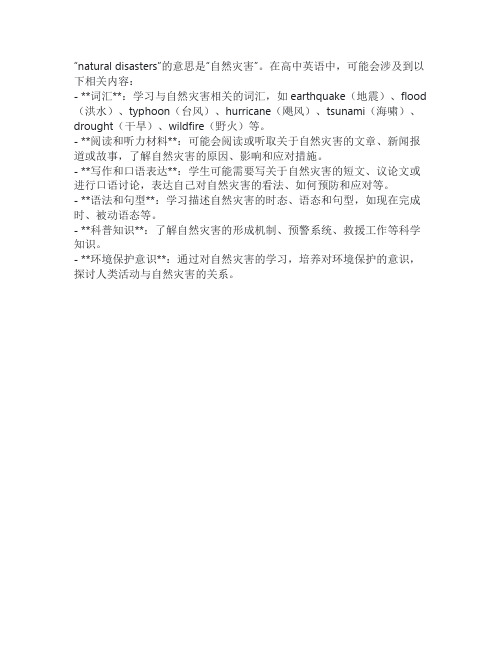
“natural disasters”的意思是“自然灾害”。
在高中英语中,可能会涉及到以下相关内容:
- **词汇**:学习与自然灾害相关的词汇,如earthquake(地震)、flood (洪水)、typhoon(台风)、hurricane(飓风)、tsunami(海啸)、drought(干旱)、wildfire(野火)等。
- **阅读和听力材料**:可能会阅读或听取关于自然灾害的文章、新闻报道或故事,了解自然灾害的原因、影响和应对措施。
- **写作和口语表达**:学生可能需要写关于自然灾害的短文、议论文或进行口语讨论,表达自己对自然灾害的看法、如何预防和应对等。
- **语法和句型**:学习描述自然灾害的时态、语态和句型,如现在完成时、被动语态等。
- **科普知识**:了解自然灾害的形成机制、预警系统、救援工作等科学知识。
- **环境保护意识**:通过对自然灾害的学习,培养对环境保护的意识,探讨人类活动与自然灾害的关系。
UNIT 4 NATURAL DISASTERS

英语 必修 第一册 (配人教版)
返回导航
UNIT 4 NATURAL DISASTERS
2.Which buildings were damaged in Seoul? 首尔的哪些建筑遭到了破坏? damage vt.损害;破坏 n.损失;损坏
The storm did a lot of damage to the crops. 暴风雨对庄稼造成了很大的破坏。
英语 必修 第一册 (配人教版)
返回导航
UNIT 4 NATURAL DISASTERS
5.Shelters set up by the government. 政府建的避难所。 shelter n.避难处;居所;庇护vt.保护;掩蔽vi.躲避(风雨或危险)
英语 必修 第一册 (配人教版)
返回导航
英语 必修 第一册 (配人教版)
指的是;参考,查阅;提到
过去常常
建立
至少 _救__火____ __洪__灾__地__区___ __援__救__工__人___ __成__百__上__千__的___
返回导航
UNIT 4 NATURAL DISASTERS
▲微口语 1.“安全指令”的常用表达 ①Stay/Keep calm. ②Make sure... ③Stay/Keep away from... ④Collect water and food if you can. ⑤Move to a safe place. ⑥Cover your face with a wet cloth. ⑦Call an emergency number.
Байду номын сангаас
The school was destroyed completely in the terrible earthquake. 这所学校在可怕的地震中被彻底地毁了。
disaster相关英语表达

disaster相关英语表达以下是一些关于“disaster”(灾难)相关的英语表达:1.Natural Disaster(自然灾害):•Earthquake: 地震•Hurricane: 飓风•Tornado: 龙卷风•Flood: 洪水•Tsunami: 海啸•Volcanic Eruption: 火山爆发•Wildfire: 森林大火2.Man-made Disaster(人为灾难):•Industrial Accidents: 工业事故•Nuclear Meltdown: 核泄漏•Environmental Pollution: 环境污染•Oil Spill: 油污泄漏•Terrorist Attack: 恐怖袭击3.Crisis Management(危机管理):•Emergency Response: 应急响应•Evacuation Plan: 撤离计划•Disaster Preparedness: 灾害准备•Relief Efforts: 救援工作•Humanitarian Aid: 人道主义援助4.Consequences and Impact(后果和影响):•Casualties: 伤亡人数•Destruction: 破坏•Displacement: 难民流离失所•Economic Losses: 经济损失•Infrastructure Damage: 基础设施损毁5.Recovery and Reconstruction(恢复和重建):•Rehabilitation: 重建•Reconstruction Efforts: 重建工作•Resilience Building: 提高抗灾能力•Recovery Phase: 恢复阶段6.Expressions:•Averting a disaster: 避免灾难•Coping with a crisis: 应对危机•Declaring a state of emergency: 宣布进入紧急状态•Humanitarian crisis: 人道主义危机•Worst-case scenario: 最坏的情况mon Phrases:•It's a catastrophe! 这是一场灾难!•We are facing a disaster of unprecedented magnitude. 我们面临前所未有的巨大灾难。
Unit4NaturalDisasters单词全英解析讲义-高中英语人教版
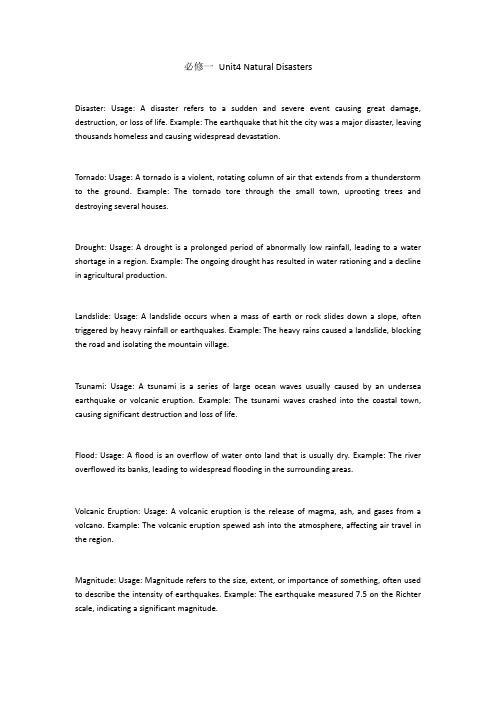
必修一Unit4 Natural DisastersDisaster: Usage: A disaster refers to a sudden and severe event causing great damage, destruction, or loss of life. Example: The earthquake that hit the city was a major disaster, leaving thousands homeless and causing widespread devastation.Tornado: Usage: A tornado is a violent, rotating column of air that extends from a thunderstorm to the ground. Example: The tornado tore through the small town, uprooting trees and destroying several houses.Drought: Usage: A drought is a prolonged period of abnormally low rainfall, leading to a water shortage in a region. Example: The ongoing drought has resulted in water rationing and a decline in agricultural production.Landslide: Usage: A landslide occurs when a mass of earth or rock slides down a slope, often triggered by heavy rainfall or earthquakes. Example: The heavy rains caused a landslide, blocking the road and isolating the mountain village.Tsunami: Usage: A tsunami is a series of large ocean waves usually caused by an undersea earthquake or volcanic eruption. Example: The tsunami waves crashed into the coastal town, causing significant destruction and loss of life.Flood: Usage: A flood is an overflow of water onto land that is usually dry. Example: The river overflowed its banks, leading to widespread flooding in the surrounding areas.Volcanic Eruption: Usage: A volcanic eruption is the release of magma, ash, and gases from a volcano. Example: The volcanic eruption spewed ash into the atmosphere, affecting air travel in the region.Magnitude: Usage: Magnitude refers to the size, extent, or importance of something, often used to describe the intensity of earthquakes. Example: The earthquake measured 7.5 on the Richter scale, indicating a significant magnitude.Rescue: Usage: Rescue involves saving someone from a dangerous or distressing situation. Example: The search and rescue team worked tirelessly to find survivors trapped under the collapsed building.Damage: Usage: Damage refers to harm or injury caused by an event or action. Example: The storm caused extensive damage to the infrastructure, leaving many without electricity.Destroy: Usage: Destroy means to completely ruin or damage something beyond repair. Example: The fire destroyed the historic building, reducing it to ashes.Evacuate: Usage: Evacuate means to move people away from a dangerous area to a safer place. Example: The authorities ordered residents to evacuate as the floodwaters continued to rise.Helicopter: Usage: A helicopter is a type of aircraft that can take off and land vertically and is often used for transportation or rescue operations. Example: The injured hiker was airlifted to safety by a helicopter.Death: Usage: Death refers to the end of life or the state of being deceased. Example: The earthquake resulted in several deaths and many injuries.Affect: Usage: Affect means to produce a change or influence something. Example: The economic crisis affected businesses and led to job losses.Shelter: Usage: Shelter is a place that provides protection and safety, especially during emergencies or disasters. Example: The relief organization set up temporary shelters for the displaced families.Crack: Usage: A crack is a narrow opening or fracture, often found in surfaces like walls or rocks. Example: The earthquake caused cracks to appear in the walls of many buildings.Gas: Usage: Gas refers to a substance in a state that is neither solid nor liquid, such as oxygen or carbon dioxide. Example: The leak of a toxic gas from the factory caused several people to fall sick.As if: Usage: "As if" is a phrase used to compare something or express a resemblance. Example: The wind howled outside as if a storm was approaching.Ruin: Usage: Ruin refers to the state of being destroyed or severely damaged. Example: The abandoned castle was in a state of ruin, with only its walls standing.In ruins: Usage: "In ruins" means something has been completely destroyed or fallen into a state of decay. Example: After the earthquake, the once-thriving city lay in ruins.Percent: Usage: Percent is a unit of measurement representing a portion out of 100. Example: Fifty percent of the population voted in favor of the new law.Brick: Usage: A brick is a rectangular block made of clay or other materials, used for building walls or structures. Example: The old house was constructed using red bricks.Metal: Usage: Metal refers to a solid material that is typically hard, shiny, and has good electrical conductivity. Example: The roof of the building was made of corrugated metal sheets.Shock: Usage: Shock is a strong emotional or physical reaction to a sudden, unexpected event. Example: The news of the accident left everyone in shock.In shock: Usage: "In shock" means being in a state of extreme surprise, disbelief, or emotional numbness. Example: She was in shock after hearing about her friend's sudden death.Electricity: Usage: Electricity is a form of energy produced by the movement of electrons, commonly used for powering devices and lighting. Example: The power outage left the entire neighborhood without electricity.Trap: Usage: To trap means to catch or confine something or someone in a confined space. Example: The hikers were trapped in the cave due to a rockfall.Bury: Usage: To bury means to put something or someone in the ground and cover it with soil. Example: The archaeologists uncovered ancient artifacts buried deep in the earth.Breathe: Usage: To breathe means to inhale and exhale air, necessary for sustaining life. Example: The fresh mountain air made it easier to breathe.Revive: Usage: To revive means to bring back to life or consciousness. Example: The lifeguard performed CPR to revive the drowning swimmer.Revival: Usage: Revival refers to the act of bringing something back to life or popularity. Example: The classic play received a revival on Broadway, attracting a new audience.Effort: Usage: Effort is the exertion of physical or mental energy to accomplish something. Example: With great effort, they managed to complete the challenging task.Unify: Usage: To unify means to bring together or combine to form a single unit or entity. Example: The treaty aimed to unify the two neighboring countries.Wisdom: Usage: Wisdom refers to the ability to apply knowledge and experience to make sound judgments and decisions. Example: The elder shared her wisdom with the younger members of the community.Context: Usage: Context is the circumstances or information that surround a particular event or situation and give it meaning. Example: Without proper context, the statement can be easily misunderstood.Suffer: Usage: To suffer means to experience pain, distress, or hardship. Example: The victims of the natural disaster suffered immense losses.Volcano:Usage:A volcano is a geological formation that results from the eruption of molten rock (magma) onto the Earth's surface. It can also refer to the vent or opening through which this magma, volcanic ash, and gases are expelled. Example: Volcanoes can have a significant impact on the environment and surrounding communities.Erupt: Usage: Erupt" is a verb that means to burst forth or release suddenly, often with great force or violence. It is commonly used to describe volcanic activity when a volcano releases magma, ash, and gases onto the Earth's surface. Example : The volcano erupted, sending a plume of ash and smoke high into the sky.Supply: Usage: Supply refers to the quantity of something available for use or distribution. Example: The stores quickly ran out of supplies during the hurricane preparation.Typhoon: Usage: A typhoon is a tropical cyclone that occurs in the Pacific region. Example: The typhoon caused widespread destruction and flooding in the coastal areas.Hurricane: Usage: A hurricane is a powerful tropical cyclone that forms in the Atlantic or eastern Pacific Ocean. Example: The hurricane's strong winds uprooted trees and damaged buildings.Survive: Usage: To survive means to continue to live or exist despite difficult circumstances. Example: With proper medical care, the patient managed to survive the life-threatening illness.Power: Usage: Power refers to the ability to control or influence others or the environment. Example: The strong winds knocked down power lines, causing a blackout.Tap: Usage: To tap means to lightly touch or strike something. Example: She tapped on the window to get her friend's attention.Pipe: Usage: A pipe is a long, tube-like structure used to convey liquids or gases. Example: The burst pipe flooded the basement of the house.Whistle: Usage: To whistle means to make a high-pitched sound by blowing air through pursed lips. Example: The coach used a whistle to signal the start of the game.Emergency: Usage: An emergency is a situation that requires immediate action to prevent harm or damage. Example: The hospital was well-prepared to handle the influx of patients during theemergency.Calm: Usage: Calm refers to a state of tranquility or lack of agitation. Example: After the storm passed, the sea returned to a calm state.Aid: Usage:Aid is a noun that refers to assistance, support, or help provided to someone in need, especially during difficult or challenging circumstances. It can also be used as a verb, "to aid," which means to provide assistance or support. Example: The humanitarian organization provided food, medical aid, and shelter to the victims of the natural disaster.Kit: Usage: Kit" is a noun that refers to a set of tools, equipment, or items assembled together for a specific purpose or activity. It is often used to describe a collection of items that are needed or useful for a particular task or situation. Example: The first-aid kit in the office contained bandages, antiseptic wipes, and pain relievers.On hand: Usage: On hand is a phrase that means having something readily available or easily accessible at the current moment. It implies that the item or resource is within reach and can be used or accessed without delay. Example: The firefighters always keep first-aid supplies on hand in case of emergencies.Crash: Usage: A crash refers to a violent collision or impact. Example: The two cars collided, resulting in a severe crash.Sweep: Usage: To sweep means to clean or move away debris or dirt with a broom or a similar tool. Example: He swept the fallen leaves off the driveway.Sweep away: Usage: To sweep away means to remove or carry away something quickly and forcefully. Example: The floodwaters swept away everything in their path.Wave: Usage: A wave is a moving ridge or swell on the surface of water. Example: The surfer rode the wave all the way to the shore.Strike: Usage: To strike means to hit or deliver a blow. Example: The lightning strike hit the tree, causing it to catch fire.Deliver: Usage: To deliver means to transport or bring something to a specific location. Example: The courier will deliver the package to your doorstep.Summary: Usage: A summary is a concise and condensed version of information or a story. Example: The professor provided a summary of the key points at the end of the lecture.Effect: Usage: Effect refers to the result or consequence of a particular action or event. Example: The new policy had a positive effect on the company's profits.Length: Usage: Length refers to the measurement of something from one end to the other. Example: The length of the river is approximately 500 kilometers.。
Unit4NaturalDisasters单元分析讲义-高中英语人教版
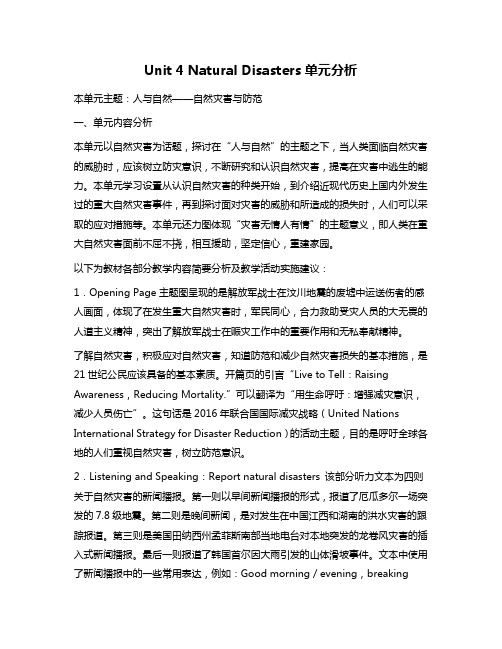
Unit 4 Natural Disasters单元分析本单元主题:人与自然——自然灾害与防范一、单元内容分析本单元以自然灾害为话题,探讨在“人与自然”的主题之下,当人类面临自然灾害的威胁时,应该树立防灾意识,不断研究和认识自然灾害,提高在灾害中逃生的能力。
本单元学习设置从认识自然灾害的种类开始,到介绍近现代历史上国内外发生过的重大自然灾害事件,再到探讨面对灾害的威胁和所造成的损失时,人们可以采取的应对措施等。
本单元还力图体现“灾害无情人有情”的主题意义,即人类在重大自然灾害面前不屈不挠,相互援助,坚定信心,重建家园。
以下为教材各部分教学内容简要分析及教学活动实施建议:1.Opening Page主题图呈现的是解放军战士在汶川地震的废墟中运送伤者的感人画面,体现了在发生重大自然灾害时,军民同心,合力救助受灾人员的大无畏的人道主义精神,突出了解放军战士在赈灾工作中的重要作用和无私奉献精神。
了解自然灾害,积极应对自然灾害,知道防范和减少自然灾害损失的基本措施,是21世纪公民应该具备的基本素质。
开篇页的引言“Live to Tell:Raising Awareness,Reducing Mortality.”可以翻译为“用生命呼吁:增强减灾意识,减少人员伤亡”。
这句话是2016年联合国国际减灾战略(United Nations International Strategy for Disaster Reduction)的活动主题,目的是呼吁全球各地的人们重视自然灾害,树立防范意识。
2.Listening and Speaking:Report natural disasters 该部分听力文本为四则关于自然灾害的新闻播报。
第一则以早间新闻播报的形式,报道了厄瓜多尔一场突发的7.8级地震。
第二则是晚间新闻,是对发生在中国江西和湖南的洪水灾害的跟踪报道。
第三则是美国田纳西州孟菲斯南部当地电台对本地突发的龙卷风灾害的插入式新闻播报。
《Natural disasters》PPT

Natural Disasters
-.
学习目标
01 知道一些基本的自然灾害有哪些 02 掌握本课时的基本语言点如rescue,
damage等 03 掌握听力技巧之精听细节 04 能独立进行新闻报道
Preview-checking
1. disaster
2. drought 3. slide 4. flood 5. magnitude 6. rescue 7. damage 8. destroy
Listen for Details
News Report 3
Listen to the news report 3 and fill in blanks.
time + damage
Breaking news, Saturday 12 August. A tornado was just seen in southern Memphis, the USA. Eyewitnesses said that at 9:25 am, the tornado destroyed four homes. A police officer tells us that at least one person has died. More tornados are possible, and the police advise avoiding the area.
Earthquake
Wenchuan, China
● 14:28 Monday, 12 May ● Magnitude 7.8 (8.0) ● At least 8,500 killed (by
13 May) ● Rescue workers (medical teams, troops, etc.)
Natural Disasters单元词汇复习课件(共12张PPT)

8.__p_o_w_e_r __n.能力;力量;电力供应;控制力 →___po_w_e_r_f_u_l _ adj.强大的;有力的→
__p_o_w_e_r_le_s_s_adj. 无力的;无能力的→
__e_m_p_o_w_e_r v. 授权
9. __c_a_lm____vt. & vi. (使)平静; (使)镇定 adj. 镇 定的;沉着的→ ___c_a_l_m_ly_____adv. 镇定的; 沉着的→ ____c_a_lm_n_e_s_s____n. 平静; 镇定 10. _e_f_f_o_r_t__n. 努力;尽力→_e_f_f_o_r_tl_e_ss_adj. 不用费力的
新人教版必修一Unit4 Natural disasters 单元词汇复习
一、词性转换
• 1.__d_i_e___v. 死亡;消亡→ __d_e_a_t_h_n. 死;死亡 →__d_e_ad__adj. 死的;枯萎的→__d_y_in_g__ adj. 垂死的; 临死的→__d_e_a_d_ly__adj. 致命的
四、语法填空
For several days before the earthquake struck Tangshan, strange things were happening. For example, chickens were too nervous 1. __t_o_e_a_t ___ (eat); mice ran out of the fields looking for places to hide. At about 3:00 a.m. on 28 July 1976, bright lights were seen in the sky and loud noises were heard, 2. ___bu_t___ the local people were asleep as usual at that time.
高中英语 人教必修第一册 Unit4 Natural Disaster 知识清单

Unit 4 Natural Disasters1. rescue. n/vt营救;救援《1》把某人从、、、营救出来: rescue sb from《2》进行营救: attempt a rescue《3》设法(实行)营救: make/perform a rescue《4》他答应在我有危险的时候会来救我。
He promised to come to my rescue if I was in danger.2. damage vt.损坏、迫害。
n损失;损害《1》弥补损失: recover a damage《2》赔偿损失: pay for damage《3》遭受损失、蒙受损害: suffer damage《4》洪水对庄稼造成重大的损毁。
The flood did/caused great damage to the crop.3.survive. vi生存;存活vt幸存、艰难度过survivor幸存者;生还者《1》靠、、、活下来;靠、、、生存: survive on《2》比某人多活、、、survive sb by《3》在这次空难中没有人幸免于难。
Nobody survived the disaster.4. destroy vt.摧毁;毁灭destruction n破坏;毁灭《1》你的话会破坏孩子的自信心。
Your words will destroy your child’s confidence.《2》我们不能再继续破坏环境了。
We can’t continue to destroy the environment.5.affect vt影响;(疾病)侵袭;深深打动;使感染(疾病)effect n 影响;效果;结果《1》我们被他的真诚深深打动。
We were affected by his sincerity.《2》如今科技极大地影响了我们的生活。
Nowadays technology has greatly affected our life.6.shelter n避难所;居所;庇护vt 保护掩蔽躲避《1》那棵大树使我们免受大雨的侵袭.The big tree sheltered us from the heavy rain.《2》这个计划是为无家可归的人提供住所。
natural disaster自然灾害

07
国际合作与减轻自然灾害的影响
国际合作在减轻自然灾害中的重要性
国际合作可以提供资金和物 资援助,帮助受灾地区恢复 重建
国际合作可以加强科学研究 和预警系统,减少自然灾害
造成的损失
国际合作可以共享经验和技 术,提高应对自然灾害的能 力
国际合作可以促进全球合作, 共同应对气候变化等全球性
问题
国际合作的现状和进展
自然灾害的分类
气象灾害:包括台风、暴雨、干旱、寒潮等 地质灾害:包括地震、火山爆发、滑坡、泥石流等 水文灾害:包括洪水、海啸、潮汐等 生物灾害:包括病虫害、疫病等 环境灾害:包括大气污染、水污染、土壤污染等 空间灾害:包括太阳风暴、宇宙射线等
自然灾害的等级划分
地震等级:根据 震级和烈度进行
地质灾害的形成原因
地壳运动:地壳板块之 间的相互作用,导致地 壳变形和断裂
火山活动:地壳内部的 岩浆活动,导致火山喷 发和地震
气候变化:气候变化导 致冰川融化、海平面上 升、干旱等,引发滑坡、 泥石流等灾害
人类活动:人类活动对 地质环境的破坏和影响, 如过度开采、不合理的 土地利用等,加剧了地 质灾害的发生。
国际社会已经认识到自然灾害的严重性,并开始加强合作
联合国和其他国际组织在协调各国行动、提供援助和资源方面发挥着重要作用
各国政府、非政府组织和企业之间的合作也在不断加强,共同应对自然灾害
国际社会在预警系统、救援行动、灾后重建等方面取得了显著进展,但仍面临许多挑战和 困难
国际合作面临的挑战和问题
生物灾害的形成原因
病原体:病毒、细菌、真菌等 生物引起
传播途径:通过空气、水、食 物等途径传播
宿主:动物、植物、人类等生 物作为宿主
环境因素:温度、湿度、光照 等环境因素影响病原体的生长 和繁殖
Unit4NaturalDisasters单词变形清单高中英语人教版

Unit4 背诵版disaster n.灾难;灾害→disasterous 灾难性的tornado n.(pl. oes or os) 龙卷风;旋风drought n.旱灾;久旱→dry adj.干燥的landslide n. ( landfall) (山地或悬崖的)崩塌;滑坡slide vi. & vt. (使)滑行;滑动tsunami n. 海啸flood n.洪水v淹没→flooded adj.洪水泛滥的→be flooded/packed/loaded/crowded with…充满…volcanic eruption火山喷发magnitude n.(地)震级;重大rescue n.& vt.营救;救援damage vt.损害;破坏n.损坏;损失→do/cause damage to 对……造成损害destroy vt. 摧毁;毁灭→destruction n.破坏→destructive adj.破坏性的evacuate vt.疏散;撤出vi.撤离→evacuation n.撤离helicopter n. 直升机death n. 死;死亡→die vi.死;消失→dead adj.死的;失去生命的;枯萎的→deadly adj.致命的→dying adj.临终的,垂死的affect vt. 影响;(疾病)侵袭;深深打动→affection n.喜爱*effect n.影响shelter n.避难处;居所vt.掩蔽vi. 躲避→sheltered adj.受庇/掩护的→shelter…from….保护…免受…crack n.裂纹;裂缝vi. & vt. (使)破裂gas n.气体as if似乎;好像;仿佛→as though 好像;仿佛ruin n.&vt. 破坏;毁坏in ruins严重受损;破败不堪percent n. 百分之……adj.&adv.每一百种→percentage n.百分比brick n.砖;砖块metal n.金属→metallic adj.金属般的shock n.震惊vt.(使)震惊→shocked adj.感到震惊的→shocking adj.令人震惊的in shock震惊;吃惊electricity n.电;电能→electrician n.电工→electric adj.电动的,用电的→electrical adj.与(用)电有关的→electronic adj.电子的trap vt.使落入险境;使陷入圈套n.陷阱→trap sb into doing sth 诱骗某人做某事bury vt.埋葬;安葬→bury oneself in/be buried in 专心于breathe vi.& vt.呼吸→breath n.呼吸;气息→breathless adj.气喘吁吁的→hold one’s breath 屏住呼吸revive vt.& vi.复活;(使)苏醒revival n.振兴;复苏effort n.努力;艰难的尝试;尽力→make an effort to do努力做某事unify vi.& vt. 统一;(使)成一体→unification n.统一wisdom n.智慧;才智→wise adj.有智慧的;明智的→wisely adv.明智地;精明地context n.上下文;语境;背景suffer vt.遭受vi. (因疾病痛苦等)受苦→suffering n.疼痛;苦难→suffer from 遭受volcano n. (pl. oes or os)火山erupt vi.& vt. (火山)爆发;(岩浆、烟等)喷出→eruption n.爆发;喷出supply n.供应;补给;[pl.] 补给品vt. 供应→supply sth to sb.把某物提供给某人typhoon n.台风in the open air露天;在户外hurricane n . (尤指大西洋的)飓风survive vi.生存vt. 幸存→survival n.幸存;继续生存;残存物→survivor n.生还者power n.电力供应;力量;控制力→within one’s power 在某人能力范围之内tap v i.& vt. 轻叩;轻敲;轻拍n.水龙头;轻叩;轻敲pipe n.子;管道=tube n.管子whistle vi.吹口哨vt. 吹口哨n. 哨子(声);呼啸声emergency n.紧急情况→emergent adj.紧急的;浮现的→take emergency action 采取紧急措施calm adj.镇静的vt.使平静→calm down镇定→calmness n.平静→calmly adv.冷静地aid n.援助;帮助;救援物资vi.& vt. (formal) 帮助;援助kit n.成套工具;成套设备first aid kit急救箱on hand现有(尤指帮助) →in hand 在处理中→by hand 手工→at hand 即将到来crash vt.& vi.碰撞;撞击n.撞车;碰撞→crash into 碰撞sweep vt. & vi. ( swept, swept) 打扫;清扫sweep away消灭;彻底消除→sweep out 打扫干净→sweep aside 对……置之不理wave n.海浪;波浪vi.& vt.挥手;招手strike vi.& vt. (struck, struck/stricken) 侵袭;突击n. 罢工;袭击deliver vt. & vi.递送vt.发表→delivery n.发表;递送→deliver a lecture 发表演讲summary n.总结;概括;概要→summarize v.总结→in summary 总之effect n.影响;结果;效果→effective adj.有效的→have an effect on 对……有影响length n.长;长度→lengthen v.(使)变长→lengthy adj.漫长的Unit4 默写版________n.灾难;灾害→________灾难性的________n.(pl. oes or os) 龙卷风;旋风________n.旱灾;久旱→dry adj.干燥的________ n. (山地或悬崖的)崩塌;滑坡________vi. & vt. (使)滑行;滑动________n. 海啸________n.洪水v淹没→_______adj.洪水泛滥的→________…充满…________火山喷发________ n.(地)震级;重大________n.& vt.营救;救援________vt.损害;破坏n.损坏;损失→____________对……造成损害________vt. 摧毁;毁灭→_________n.破坏→__________adj.破坏性的________vt.疏散;撤出vi.撤离→___________n.撤离________n. 直升机________n. 死;死亡→_________vi.死;消失→__________ adj.死的;失去生命的;枯萎的→__________adj.致命的→________adj.临终的,垂死的________vt. 影响;(疾病)侵袭;深深打动→__________ n.喜爱________n.避难处;居所vt.掩蔽vi.躲避→________adj.受庇/掩护的→________保护…免受…________n.裂纹;裂缝vi. & vt. (使)破裂________ n.气体________似乎;好像;仿佛→__________好像;仿佛________n.&vt. 破坏;毁坏________严重受损;破败不堪________n. 百分之……adj.&adv.每一百种→___________n.百分比________n.砖;砖块________n.金属→________ adj.金属般的________n.震惊vt.(使)震惊________adj.感到震惊的→________ adj.令人震惊的________震惊;吃惊________n.电;电能→________n.电工→________adj.电动的,用电的→_______ adj.与(用)电有关的→__________ adj.电子的________vt.使落入险境;使陷入圈套n.陷阱→__________诱骗某人做某事________vt.埋葬;安葬→__________专心于________vi.& vt.呼吸→_____n.呼吸→_____adj.气喘吁吁的→_______屏住呼吸_________vt.& vi.复活;(使)苏醒_________n.振兴;复苏________n.努力;艰难的尝试;尽力→_______________努力做某事________vi.& vt. 统一;(使)成一体→__________n.统一________ n.智慧;才智→___________adj.明智的→_________ adv.明智地;精明地________n.上下文;语境;背景________vt.遭受vi. (因疾病痛苦等)受苦→________n.疼痛;苦难→______ 遭受________ n. (pl. oes or os)火山_________ vi.& vt. (火山)爆发;(岩浆、烟等)喷出→__________n.爆发;喷出________n.供应;补给;[pl.] 补给品vt. 供应→_________.把某物提供给某人________n.台风________露天;在户外________ n . (尤指大西洋的)飓风________vi.生存vt.幸存→________ n.幸存;继续生存;残存物→________n.生还者________n.电力供应;力量;控制力→________在某人能力范围之内________ vi.& vt. 轻叩;轻敲n.水龙头;轻叩;轻敲________ n.子;管道=tube n.管子________vi.吹口哨vt. 吹口哨n. 哨子(声);呼啸声________n.紧急情况→________adj.紧急的;浮现的→________采取紧急措施________adj.镇静的vt.使平静→________镇定→________ n.平静→________adv.冷静地________n.援助;帮助;救援物资vi.& vt. (formal) 帮助;援助________n.成套工具;成套设备________急救箱________现有(尤指帮助) →______在处理中→______手工→______即将到来________vt.& vi.碰撞;撞击n.撞车;碰撞→________ 碰撞________ vt. & vi. 打扫;清扫;过去式/过去分词________________消灭;彻底消除→________打扫干净→________ 对……置之不理________ n.海浪;波浪vi.& vt.挥手;招手________ vi.& vt.侵袭n. 罢工;袭击过去式/过去分词________________ vt. & vi.递送vt.发表→________ n.发表;递送→________ 发表演讲________ n.总结;概括;概要→________v.总结→________ 总之________ n.影响;结果;效果→________adj.有效的→________对……有影响________ n.长;长度→________ v.(使)变长→________ adj.漫长的。
人教版高中英语必修一第四单元词汇分类汇总
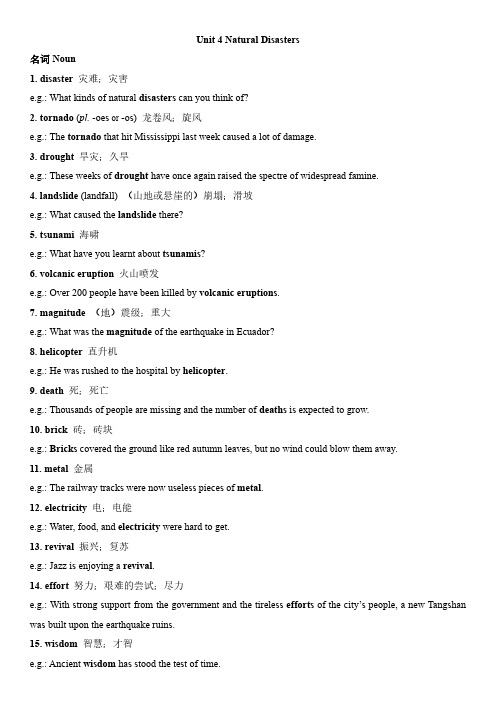
Unit 4 Natural Disasters名词Noun1. disaster灾难;灾害e.g.: What kinds of natural disasters can you think of?2. tornado (pl. -oes or -os) 龙卷风;旋风e.g.: The tornado that hit Mississippi last week caused a lot of damage.3. drought旱灾;久旱e.g.: These weeks of drought have once again raised the spectre of widespread famine.4. landslide (landfall) (山地或悬崖的)崩塌;滑坡e.g.: What caused the landslide there?5. tsunami海啸e.g.: What have you learnt about tsunamis?6. volcanic eruption火山喷发e.g.: Over 200 people have been killed by volcanic eruptions.7. magnitude(地)震级;重大e.g.: What was the magnitude of the earthquake in Ecuador?8. helicopter直升机e.g.: He was rushed to the hospital by helicopter.9. death死;死亡e.g.: Thousands of people are missing and the number of deaths is expected to grow.10. brick砖;砖块e.g.: Bricks covered the ground like red autumn leaves, but no wind could blow them away.11. metal金属e.g.: The railway tracks were now useless pieces of metal.12. electricity电;电能e.g.: Water, food, and electricity were hard to get.13. revival振兴;复苏e.g.: Jazz is enjoying a revival.14. effort努力;艰难的尝试;尽力e.g.: With strong support from the government and the tireless efforts of the city’s people, a new Tangshan was built upon the earthquake ruins.15. wisdom智慧;才智e.g.: Ancient wisdom has stood the test of time.16. context上下文;语境;背景e.g.: You should be able to guess the meaning of the word from the context.17. volcano火山e.g.: The couple who live next to us volunteered to help after the volcano erupted.18. typhoon台风e.g.: Here are some of the people whose homes were destroyed by the typhoon.19 hurricane(尤指西大西洋的)飓风e.g.: Several days later, most of the buildings that had been damaged by the hurricane were repaired.20. power电力供应;能量;力量;控制力e.g.: They’ve switched off the power.21. pipe管子;管道e.g.: Copper pipe is sold in lengths.22. emergency突发事件;紧急情况e.g.: An emergency supply of food was transported to the area by the army.23. kit成套工具;成套设备e.g.: You can get kits to do this from DIY stores.24. summary总结;概括;概要e.g.: A summary should be around one third the length of the original text.25. effect影响;结果;效果e.g.: What are the possible effects of the disaster?26. length长;长度e.g.: Is the summary proper length?动词Verb1. slide(使)滑行;滑动e.g.: We slide down the grassy slope.2. destroy摧毁;毁灭e.g.: Whole sections of cities were destroyed.3. evacuate疏散;撤出/ 撤离e.g.: Police evacuated nearby buildings.4. affect影响;(疾病)侵袭;深深打动e.g.: The earthquake affected an area of several hundred square kilometers.5. bury埋葬;安葬e.g.: Soldiers and volunteers worked as hard as they could to pull away bricks and rocks, and rescue those who were buried under the ruins.6. breathe呼吸e.g.: Slowly, the city began to breathe again.7. revive复活;(使)苏醒e.g.: Tangshan began to revive itself and get up on its feet again.8. unify统一;(使)成一体e.g.: Tangshan city has proved to China and the rest of the world that in times of disaster, people must unify and show the wisdom to stay positive and rebuild for a brighter future.9. suffer遭受;蒙受/ (因疾病、痛苦、悲伤等)受苦e.g.: Some were found alive, though they were suffering from terrible injuries.10. erupt(火山)爆发;(岩浆、烟等)喷出e.g.: According to experts, the volcano could erupt this week.11. survive生存;存活/ 幸存;艰难度过e.g.: She’s feeding the baby who survived the earthquake.12. sweep (swept, swept) 打扫;清扫e.g.: She swept the crumbs into the wastebasket.13. deliver递送;传达/ 发表e.g.: We promise to deliver within 48 hours.兼类词Words with Multiple Part of Speech1. flood n.洪水;大量vi. 淹没;大量涌入vt.使灌满水;淹没e.g.: Where are the floods?2. rescue n. & vt.营救;救援e.g.: What are the rescue workers and soldiers doing the flood-hit area?3. damage vt. 损害;破坏n.损坏;损失e.g.: Which buildings were damaged there?4. shelter n.避难处;居所;庇护vt.保护;掩蔽vi.躲避(风雨或危险)e.g.: Workers built shelters for survivors whose homes had been destroyed.5. crack n.裂纹;裂缝vi. & vt.(使)破裂e.g.: There were deep cracks that appeared in the well walls.6. ruin n. & vt.破坏;损坏e.g.: The 8.0-magnitude earthquake that killed over 80,000 people and left many more injured turned manytowns and counties into ruins.7. percent n.百分之……adj. & adv.每一百中e.g.: About 75 percent of the city’s factories and buildings, 90 percent of its homes, and all of its hospitals were gone.8. shock n.震惊;令人震惊的事;休克vt.(使)震惊e.g.: He’s still in a state of shock.9. trap vt.使落入险境;使陷入圈套n.险境;陷阱e.g.: Soon after the quakes, the army sent 150,000 soldiers to Tangshan to dig out those who were trapped and to bury the dead.10. supply n.供应(量);补给;[pl.] 补给品vt.供应;供给e.g.: The supplies which were provided to the disaster area were collected from around the country.11. tap vi. & vt.轻叩;轻敲;轻拍n.水龙头;轻叩;轻敲e.g.: Someone tapped at the door.12. whistle vi.吹口哨;发出笛声vt.吹口哨n.哨子(声);呼啸声e.g.: The referee finally blew the whistle to stop the game.13. calm adj.镇静的;沉着的vt.使平静;使镇静e.g.: It is important to keep calm in an emergency.14. aid n.援助;帮助;救援物资vi. & vt.帮助;援助e.g.: They made a request for further aid.15. crash vi. & vt.碰撞;撞击n.撞车;碰撞e.g.: A girl was killed yesterday in a crash involving a stolen car.16. wave n.海浪;波浪vi. & vt.挥手;招手e.g.: A series of waves expands in all directions.17. strike vi. & vt. (struck, struck/stricken) 侵袭;突击;击打n.罢工;罢课;袭击e.g.: Tsunami waves can strike out of nowhere and cause a lot of destruction.短语Expression1. as if似乎;好像;仿佛e.g.: She travels around the world as if money is no object.2. in ruins严重受损;破败不堪e.g.: In less than one minute, a large city lay in ruins.3. in shock震惊;吃惊e.g.: People were in shock – and then, later that afternoon, another big quake shook Tangshan again.4. in the open air露天;在户外e.g.: The next day, people put up shelters in the open air using anything that they could find.5. first aid kit急救箱e.g.: Is there a first aid kit on every floor of the factory?6. on hand现有(尤指帮助)e.g.: The emergency services were on hand with medical service.7. sweep away消灭;彻底消除e.g.: The commission’s conclusions sweep away a decade of denials and cover-ups.。
Unit4Naturaldisasters重点单词短语句型清单-高中英语人教版

breathe regularly 均匀呼吸
breathe hard 呼吸困难
breathe deeply = take a deep breath 深呼吸
hold one’s breath 屏住呼吸
lose one’s breath 喘不上气来
out of breath 气喘吁吁,上气不接下气
12.effort n.努力;艰难的尝试;尽力
spare no effort (s) to do sth.不遗余力地做某事
put effort into (doing) sth. 努力做某事
with/ without effort 费力地/毫不费力地
make an effort to do sth. = make efforts to do sth. 努力/尽力做......
13.wisdom n.智慧;才智
wise adj. (行为或决定)明智的
wisely adv.明智地
14.suffer vt. 遭受;蒙受vi.(因疾病、痛苦、悲伤等)受苦
suffer pain /damage /failure 遭受痛苦/破坏/失败
suffer from受……的折磨;因……而受苦
suffering n. 苦难,痛苦sufferer n. 受难者
15.as if似乎;好像;仿佛= as though
如果as if引导的从句表示的情况与事实相反或者不大可能实现,从句要用虚拟语气。
16.shock n.震惊,休克——shocked adj.震惊的——shocking adj.令人震惊的。
新人教版高中英语必修第一册Unit4Natural Disasters单词记忆版+默写版(英文,音标,词性,词义) - 副本
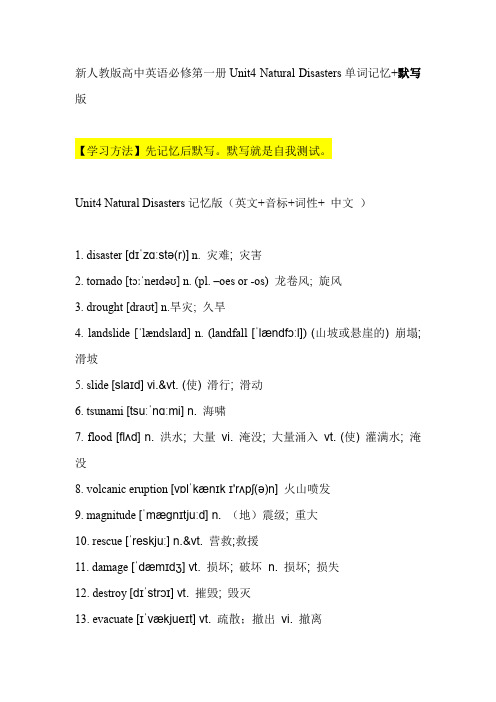
新人教版高中英语必修第一册Unit4 Natural Disasters单词记忆+默写版【学习方法】先记忆后默写。
默写就是自我测试。
Unit4 Natural Disasters记忆版(英文+音标+词性+ 中文)1. disaster [dɪˈzɑːstə(r)] n.灾难; 灾害2. tornado [tɔːˈneɪdəʊ] n. (pl. –oes or -os) 龙卷风; 旋风3. drought [draʊt] n.旱灾; 久旱4. landslide [ˈlændslaɪd] n. (landfall[ˈlændfɔːl]) (山坡或悬崖的) 崩塌; 滑坡5. slide [slaɪd] vi.&vt. (使) 滑行; 滑动6. tsunami [tsuːˈnɑːmi] n. 海啸7. flood [flʌd] n. 洪水; 大量vi. 淹没; 大量涌入vt. (使) 灌满水; 淹没8. volcanic eruption [vɒlˈkænɪk ɪ'rʌpʃ(ə)n] 火山喷发9. magnitude [ˈmæɡnɪtjuːd] n. (地)震级; 重大10. rescue [ˈreskjuː] n.&vt. 营救;救援11. damage [ˈdæmɪdʒ] vt. 损坏; 破坏n. 损坏; 损失12. destroy [dɪˈstrɔɪ] vt. 摧毁; 毁灭13. evacuate [ɪˈvækjueɪt] vt. 疏散;撤出vi. 撤离14. helicopter [ˈhelɪkɒptə(r)] n. 直升机15. death [deθ] n. 死; 死亡16. affect [əˈfekt] vt. 影响; (疾病)侵袭;深深打动17. shelter [ˈʃeltə(r)] n. 避难处; 居所; 庇护vt. 保护; 掩蔽vi. 躲避(风雨或危险)18. crack [kræk] n. 裂纹; 裂缝vi&vt. (使)破裂19. as if [æz ɪf] 似乎; 好像; 仿佛20. ruin [ˈruːɪn] n.&vt.破坏; 毁坏21. in ruins 严重受损;破败不堪22. percent [pəˈsɛnt] n. 百分之… adj.&adv. 每一百中23. brick [brɪk] n. 砖; 砖块24. met al [’me tl] n. 金属25. shock [ʃɒk] n. 震惊; 令人震惊的事; 休克vt. (使)震惊26. in shock 震惊; 吃惊27. electricity [ɪˌlekˈtrɪsəti] n. 电; 电能28. trap [træp] vt. 使落入险境; 使陷入圈套n. 险境;陷阱29. bury [ˈberi] vt. 埋葬; 安葬30. breathe [briːð] vi.&vt. 呼吸31. revive [rɪˈvaɪv] vt.vi.复活; (使) 苏醒32. revival [rɪˈvaɪvl] n. 振兴; 复苏33. effort [ˈefət] n. 努力; 艰难的尝试; 尽力34. unify [ˈjuːnɪfaɪ] vi.&vt. 统一; (使)成一体35. wisdom [ˈwɪzdəm] n. 智慧; 才智36. context [ˈkɒntekst] n. 上下文; 语境; 背景37. suffer [ˈsʌfə(r)] vt. 遭受; 蒙受vi. (因疾病、痛苦、悲伤等) 受苦38. volcano [vɒlˈkeɪnəʊ] n. (pl. volcanoes or volcanos) 火山39. erupt [ɪˈrʌpt] vi.&vt. (火山) 爆发; (岩浆、烟等) 喷出40. supply [səˈplaɪ] n. 供应(量); 补给; [pl.]补给品vt. 供应;供给41. typhoon [taɪˈfuːn] n. 台风42. in the open air 露天;在户外43. hurricane [ˈhʌrɪkən] n. (尤指西大西洋的) 飓风44. survive [səˈvaɪv] vi. 生存; 存活vt. 幸存; 艰难度过45. power [ˈpaʊə(r)] n. 电力供应;能量;力量;控制力46. tap [tæp] vi.&vt. 轻叩;轻敲;轻拍n. 水龙头;轻叩;轻敲47. pipe [paɪp] n. 管子; 管道48. whistle [ˈwɪsl] vi. 吹口哨; 发出笛声vt. 吹口哨n. 哨子(声); 呼啸声49. emergency [iˈmɜːdʒənsi] n. 突发事件; 紧急情况50. calm [kɑːm] adj. 镇静的; 沉着的vt. 使平静; 使镇静51. aid [eɪd] n. 援助; 帮助; 救援物资vi.&vt. 帮助; 援助52. kit [kɪt] n. 成套工具; 成套设备53. first aid kit [fɜːst eɪd kɪt] n. 急救箱54. on hand [ɒn hænd] 现有(尤指帮助)55.crash [kræʃ] vt.&vi. 碰撞; 撞击n. 撞车;碰撞56. sweep [swi:p] vt.&vi. (swept [swept], swept) 打扫,清扫57. sweep away [swiːp əˈweɪ] 消灭;彻底消除58. wave [weɪv] n. 海浪; 波浪vi.&vt. 挥手; 招手59. strike [straɪk] vi.&vt. (struck[strʌk], struck/ striken[ˈstrɪkən]) 袭击; 突袭;击打n. 罢工; 罢课; 袭击60. deliver [dɪˈlɪvə(r)] vt.&vi. 递送; 传送vt. 发表61. summary [ˈsʌməri] n. 总结; 概括; 概要62. effect [ɪˈfekt] n. 影响; 结果; 效果63. length [leŋθ] n. 长; 长度新人教版高中英语必修第一册Unit4 Natural Disasters单词默写版【学习方法】先记忆后默写。
《Natural disasters》 说课稿

《Natural disasters》说课稿尊敬的各位评委、老师:大家好!今天我说课的内容是《Natural disasters》。
下面我将从教材分析、学情分析、教学目标、教学重难点、教学方法、教学过程以及教学反思这几个方面来展开我的说课。
一、教材分析《Natural disasters》这一主题通常出现在英语教材中的科普类或社会类单元中。
它涵盖了地震、洪水、飓风、火山喷发等多种常见的自然灾害类型,不仅能够帮助学生扩充词汇量,还能让学生了解自然灾害的特点、危害以及应对措施,培养学生的环保意识和应对危机的能力。
从教材的编排来看,通常会通过阅读、听力、写作等多种形式来呈现这一主题。
阅读材料可能会包括有关自然灾害的新闻报道、科普文章等;听力部分可能会有关于灾害经历的讲述或者灾害预警的信息;写作部分则可能要求学生描述一种自然灾害或者提出应对灾害的建议。
二、学情分析本次授课的对象是具体年级的学生。
他们已经具备了一定的英语基础,掌握了一定的词汇和语法知识,能够进行简单的英语交流和书面表达。
然而,对于自然灾害这一较为复杂和严肃的主题,学生可能在词汇量和背景知识方面存在不足,需要在教学过程中进行补充和强化。
此外,这个年龄段的学生好奇心强,喜欢探索新鲜事物,但他们的注意力集中时间相对较短,需要通过多样化的教学方法和生动有趣的教学活动来激发他们的学习兴趣,保持他们的学习积极性。
三、教学目标基于对教材和学情的分析,我制定了以下教学目标:1、知识目标(1)学生能够掌握与自然灾害相关的常见词汇,如 earthquake, flood, hurricane, volcano 等。
(2)学生能够理解并运用描述自然灾害的句型,如“An earthquake happened in” “The flood caused a lot of damage” 等。
2、技能目标(1)通过阅读和听力练习,提高学生获取信息和理解大意的能力。
natural disasters 高中英语

natural disasters 高中英语全文共四篇示例,供读者参考第一篇示例:自然灾害是指由于自然原因而造成的突发性灾害事件,如地震、火山喷发、飓风、龙卷风、洪水、干旱等。
这些灾害往往带来毁灭性的影响,给人类的生命和财产安全带来严重威胁。
自然灾害是地球的一部分,人类需要与之共存,因此了解自然灾害并做好应对措施是至关重要的。
地震是一种常见的自然灾害。
地震是由地壳板块构造运动引起的地球内部能量释放而产生的地震波,会引起地面震动、地表沉陷、土石流等现象,造成巨大的破坏。
地震常发生在地震带,如太平洋火山带、喜马拉雅地震带等。
为了减少地震带来的伤害,我们可以通过建筑加固、地震避难演练等方式来预防和减少地震造成的伤害。
火山喷发是另一种常见的自然灾害。
火山是地壳中的熔岩通过火山口喷出,形成的地质现象。
火山喷发会释放出高温的熔岩、岩浆和火山灰等物质,对周围的生物和人类造成极大的危害。
火山喷发往往伴随着地震、烟尘、火山弹等现象,对周围环境造成污染和破坏。
为了减少火山喷发带来的危害,我们可以通过监测火山活动、规划疏散路线等方式来降低人员伤亡和财产损失。
飓风和龙卷风是造成重大破坏的极端天气现象。
飓风是海洋上的气旋风暴,具有强烈的对流旋风,风速可达每小时200公里以上,对沿海地区和海岸线造成严重影响。
龙卷风是强烈的环流气流和气旋风暴,通常伴随着旋转的漏斗云,具有短暂但强烈的破坏力。
为了减少飓风和龙卷风的影响,我们可以通过气象预警系统、加固建筑、房屋保险等方式来减少人员伤亡和财产损失。
洪水是由于降水过多或江河水位上涨而导致的大面积水灾事件。
洪水往往会造成河流溢出、农田被淹、城市停电等后果,对周围的生活和经济造成严重破坏。
为了减少洪水的危害,我们可以通过加强防洪堤坝建设、疏浚排水渠、定期清理下水道等方式来减少洪水灾害的发生和扩大。
干旱是由于长时间缺乏降水而导致的干旱现象,对农业、生态系统和人类生活造成严重危害。
干旱会造成农作物减产、土地荒漠化、水资源供应不足等影响,给社会和经济带来严重困扰。
Unit 4 Natural Disasters Words and Expressions课件
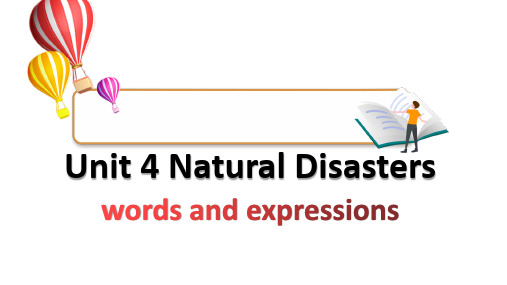
• starve to death 饿死
• be sentenced to death 被判死刑
• death of one’s hopes 某人希望的 破灭
n.毁灭,破灭
That defeat meant the death of all my hopes .那次 失败毁灭了我所有的希望。 the death of one ’ s hopes 某人希望的破灭 the death of his career 他职业生涯的毁灭 the death of all my plans 我所有计划的破灭 a matter of life and death 攸关生死之事
v / adj .+- th → n . grow v. 增长→ growth n .增长 long adj .长的→ length n .长度 wide adj .宽的→ width n .宽度 deep adj .深的→ depth n .深度 true adj .正确的→ truth n .真理 young adj .年轻的+ youth n .青春
evacuate
vt.疏散,撤出 vi.撤离 • evacuate from 从...撤退;
从...转移;从...疏散 • evacuate to 撤退至;疏散至;
转移到 • evacuated to 被抽真空
adj. evacuated 疏散的;排空 的,撤退者的
n. evacuation 撤离,疏散; 排泄,排空,清除
Unit 4 Natural Disasters
disaster n. 灾难,灾害
• environmental disasters 环境灾害 a natural disaster 自然灾害
Unit 4 Natural Disaster 词汇学习 1 + 语训练 (教师版人教版必修第一册)

Unit 4 Natural Disaster 词汇学习1 + 语篇训练(教师版)【新教材精创】2020-2021学年高一英语新教材知识讲学(人教版必修第一册)Step1 词汇分类记忆Task 1阅读词汇:1,tornado龙卷风;旋风2,landslide (山地或悬崖的)崩塌;滑坡3,tsunami 海啸4,volcanic eruption 火山喷发5,magnitude (地)震级;重大6,evacuate 疏散;撤出7, helicopter直升飞机8, revive 复活;(使)苏醒9, revival 振兴;复苏10, unify统一;(使)成一体11, context上下文;语境;背景12, erupt (火山)爆发;(岩浆、烟等)喷出13, hurricane (尤指西大西洋的)飓风14, tap vi. & vt. 轻叩;轻敲;轻拍;n. 水龙头、轻叩;轻敲15, whistle vi.吹口哨;发出笛声;n. 哨子声;呼啸声16, emergency突发事件;紧急情况17, crash碰撞;撞击18,kit 成套工具;成套设备19, Ecuador厄瓜多尔(国家名)20, Memphis 孟菲斯(美国城市)21, Alberta艾伯塔省(加拿大省份)22, Colombo科伦坡(斯里兰卡首都)23, Sri Lanka斯里兰卡24, Indonesia印度尼西亚25, Thailand 泰国(国家名)26, Malaysia马来西亚27, Sumatra Island 苏门答腊岛28, Chandra Theeravit钱德拉∙特拉为Task 2 写作词汇1,灾难;灾害disaster2,旱灾;久旱drought3,(使)滑行;滑动slide5,洪水;大量;淹没flood5,营救;救援rescue6,损害;迫害damage6,摧毁;毁灭destroy7,死;死亡death8,影响;(疾病)侵袭;深深打动affect9,避难处;居所;保护;掩蔽;躲避shelter10,裂纹;裂缝crack11,似乎;好像;仿佛as if/though12, 破坏;毁坏ruin13,严重损坏;破败不堪in ruins14,百分之……;每一百中percent15,砖;砖块brick16,金属metal17,震惊;令人震惊的事shock18,震惊;吃惊(短语) in shock19,电;电能electricity20,使落入险境trap21,埋葬;安葬bury22,呼吸breathe23,努力;艰难的尝试effort24,智慧;才智wisdom25,遭受;蒙受suffer26,火山volcano 27,供应;补给supply28,台风typhoon29,露天;在户外in the open air30,生存;幸存survive31,电力供应;能量;力量power32,管子;管道pipe33,镇静的;沉着的calm34,援助;帮助aid35,first aid kit急救箱36,现有(尤指帮助) on hand37,打扫;清扫sweep38,消灭;彻底消除sweep away 39,波浪;挥手;招手wave40,侵袭;袭击;击打strike41,递送;传达deliver42,总结;概括;概要summary43,影响;结果;效果effect44,长;长度lengthStep 2词汇运用检测Task 1 Complete the following sentences with the Chinese translation.1.They had led the country into economic disaster.他们把国家带入了经济灾难中。
新版人教高中英语必修一Unit4 Natural disasters核心考点归纳
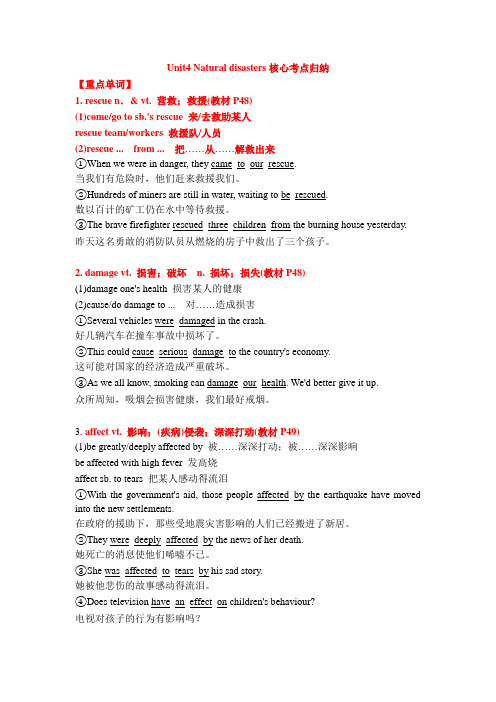
Unit4 Natural disasters核心考点归纳【重点单词】1. rescue n.& vt. 营救;救援(教材P48)(1)come/go to sb.'s rescue 来/去救助某人rescue team/workers 救援队/人员(2)rescue ... from ... 把……从……解救出来①When we were in danger, they came_to_our_rescue.当我们有危险时,他们赶来救援我们。
②Hundreds of miners are still in water, waiting to be_rescued.数以百计的矿工仍在水中等待救援。
③The brave firefighter rescued_three_children_from the burning house yesterday.昨天这名勇敢的消防队员从燃烧的房子中救出了三个孩子。
2. damage vt. 损害;破坏n. 损坏;损失(教材P48)(1)damage one's health 损害某人的健康(2)cause/do damage to ... 对……造成损害①Several vehicles were_damaged in the crash.好几辆汽车在撞车事故中损坏了。
②This could cause_serious_damage_to the country's economy.这可能对国家的经济造成严重破坏。
③As we all know, smoking can damage_our_health. We'd better give it up.众所周知,吸烟会损害健康,我们最好戒烟。
3. affect vt. 影响;(疾病)侵袭;深深打动(教材P49)(1)be greatly/deeply affected by 被……深深打动;被……深深影响be affected with high fever 发高烧affect sb. to tears 把某人感动得流泪①With the government's aid, those people affected_by the earthquake have moved into the new settlements.在政府的援助下,那些受地震灾害影响的人们已经搬进了新居。
- 1、下载文档前请自行甄别文档内容的完整性,平台不提供额外的编辑、内容补充、找答案等附加服务。
- 2、"仅部分预览"的文档,不可在线预览部分如存在完整性等问题,可反馈申请退款(可完整预览的文档不适用该条件!)。
- 3、如文档侵犯您的权益,请联系客服反馈,我们会尽快为您处理(人工客服工作时间:9:00-18:30)。
The Natural Disasters
As we all know, natural disasters are very terrible. Natural disasters will bring great human disaster. It is not only the destruction of human wealth, but also makes people die.
In 2008, is hard to forget a year of the Chinese people. Not only because we held the summer Olympics, but also because in that year’s natural disasters. For example, China large snow disasters, snow and ice disaster caused 19 provinces, municipalities and autonomous regions and Xinjiang Production and Construction Corps occurred in varying degrees of disaster. At that time, the Spring Festival approaching, many people who are going out to work the way home. Because of this snow disaster, many people are trapped in the cars and trains. They can not go home. The snow disaster brings our country huge economic losses. However, this is not the worst natural disaster in the 2008 year. May 12, 2008, China Wenchuan earthquake disaster, eight provinces and cities is the shock, the death toll of more than eighty-seven thousand five hundred people. 845.1 billion yuan in direct economic losses. Wenchuan earthquake shocked the world. The earthquake destroyed almost the entire Wenchuan; the Chinese people are in grief.
The power of nature is very great. It can create human beings, can also destroy mankind. We can not destroy the natural environment, or we will get a natural retaliation. For example, the dust storms. The destructive power of natural disasters is very terrible, so we must love the earth and protect our only home.。
